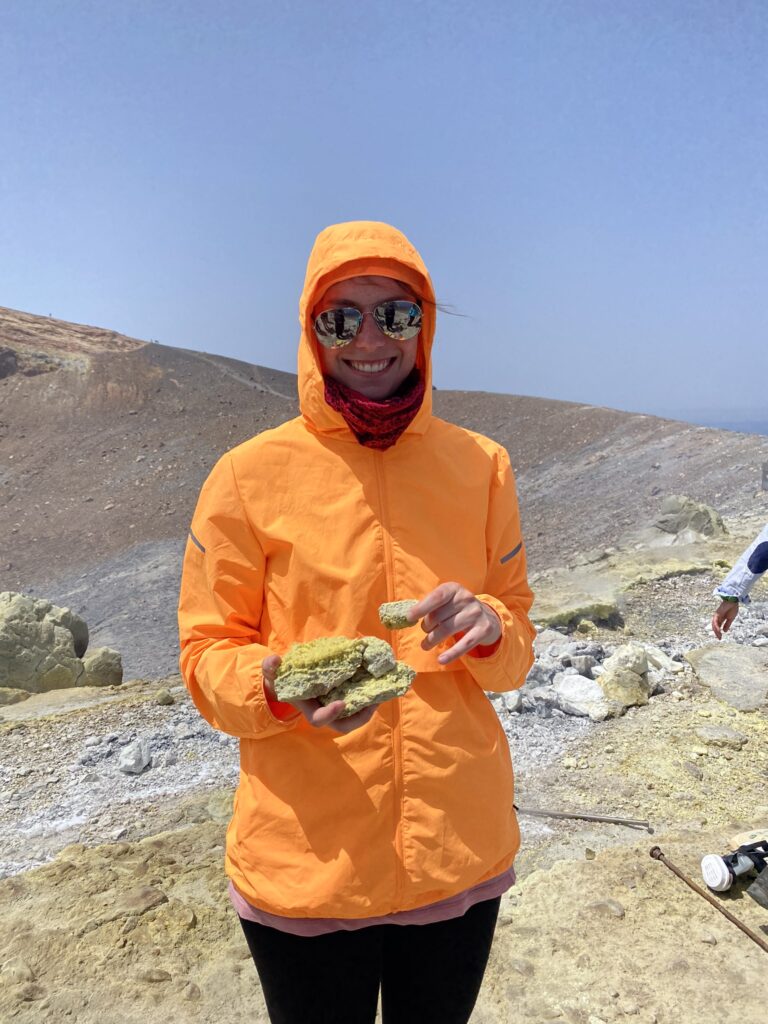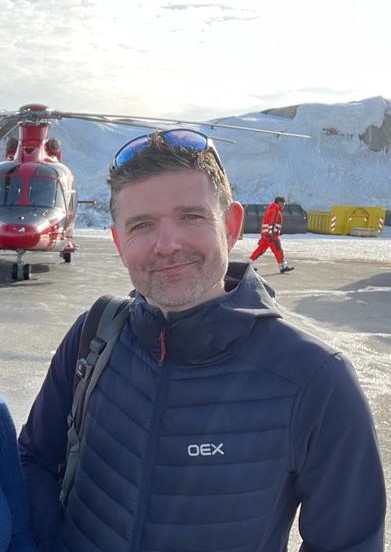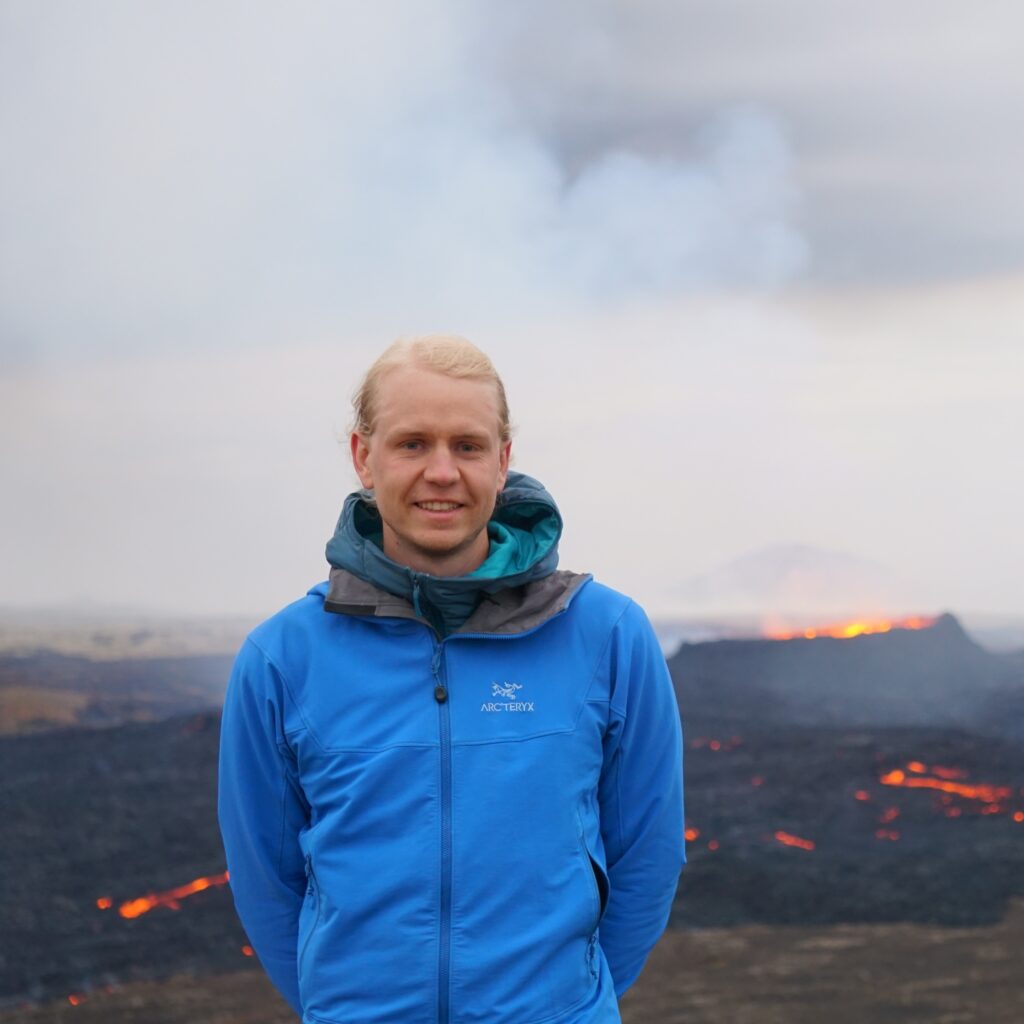Current Leaders
Linda Sobolewski (IAVCEI co-chair)
I finished my PhD in Physical Geography at the Ruhr-University Bochum in April 2023 focusing on the investigation of subglacial volcanic caves in the Cascade Volcanic Arc. I have a passion for volcanic environments, especially in combination with ice, and enjoy doing fieldwork in diverse volcanic settings. In August 2024 I started my Postdoc position at the University of Iceland to investigate long-term volcano-ice interactions at Eyjafjallajökull.


Iestyn Barr (IAVCEI vice-chair)
I’m a Reader in Physical Geography at Manchester Metropolitan University. My background is in glaciology, and I have a passion for mountain environments. My research investigates glacier-volcano interactions in several areas globally including Alaska, Iceland, Kamchatka, and Antarctica.
Maximillian Van Wyk de Vries (IACS co-chair)
I am an Assistant Professor in Natural Hazards in the departments of Geography and Earth Sciences, and lead the Cambridge Complex and Multihazard research group (CoMHaz). I work broadly on multihazard, with a focus on landslides, volcanoes, cryospheric hazards, and the interactions between these. I have a broad range of research interests, in particular integrating remote sensing, numerical modelling, and fieldwork to understand the interactions between multiple hazards.


Tryggvi Unnsteinsson (IACS vice-chair)
I am a PhD student in Physical Geography at University of Aberdeen, and in my studies I use remote sensing to analyse how volcanic heat affects glacier dynamics. Glaciovolcanic environments have long fascinated me and they have been a key component of both my academic and professional career.
Former Leaders
- Rosie Cole (IAVCEI Co-chair): University of Iceland rosiecole@hi.is
- Chris Conway (IAVCEI Vice-chair): Geological survey of Japan c.conway@aist.go.jp
- Shaun Eaves (IACS Co-chair): Victoria University of Wellington shaun.eaves@vuw.ac.nz
- Rodrigo Soteres (IACS Vice-chair): Pontificia Universidad Católica de Chile rlsoteres@uc.cl
- Erin Fitch (Secretary): University of Oregon efitch@uoregon.edu
Commission Charter
The elected officers support the commission purpose by:
- Holding workshops, short-courses, meetings, seminars, and field trips on volcano–ice interactions.
- Supporting special sessions at relevant national and international meetings.
- Fostering communication among commission members through our listserv, web page, periodic newsletters, and extend communications broadly through social media account(s), and broader community listservs.
- Supporting the broad utility of glaciovolcanic sequences for understanding environmental and landscape change, with active input from researchers within the fields of paleoclimatology, glaciology, and geomorphology.
- Fostering networking across commission members’ interests, within, but not limited to: mass flows and volcanic hazards generated by volcano–ice interactions; glaciovolcanic styles and terminology; and region specific interest groups (e.g., Antarctica, Iceland, South America, Mars).
Advisory Committee
- Ben Edwards: Dickinson College
- Sarah Fagents: University of Hawaii
- Magnús Tumi Guðmundsson: University of Iceland
- Christian Huggel: University of Zurich
- Dave McGarvie: Lancaster University
- Andres Rivera: Universidad de Chile
- John Smellie: Leicester University
Terms of Reference
Organizational structure
Co-Chair (IAVCEI/IACS): responsible for overseeing progress on commission goals.
Vice-Chair (IAVCEI/IACS): responsible for identifying the coming year’s program of meetings and helping to promote and advertise those meetings.
Secretary: responsible for communicating information about commission activities with the members via a newsletter/email/webpage.
Election process
The incoming co-chairs, vice-chairs and secretary can volunteer themselves or be nominated by Commission Members and existing Officers. Nominations should be sent to the existing secretary. The ballot with all nominees for each position will be sent to all Members at least 2 weeks prior to the vote. Each officer position will be elected by a single majority vote of all votes cast by the VIIC Members. The elected Officers must be approved by the Advisory Board. Incoming IACS representatives must be members of IACS and must be approved by the IACS bureau. Elections will occur every 4 years. One IAVCEI officer and IACS officer will volunteer to remain in ex-officio positions for one year to ensure continuity.
Guidelines
Members of the VIIC leadership group will regularly communicate via email and online meetings to identify and report on action items for achieving the commission goals. Co-chairs will oversee these meetings and identify key tasks. Vice-chairs will ensure that VIIC are involved in organizing and participating in conference sessions at scientific assemblies (especially IUGG conferences), and will strive for diverse and inclusive representation in these events. The secretary will communicate major announcements to the VIIC membership and record notes from group meetings. All leaders will contribute to maintaining the website and Twitter account, and can provide assistance to the other roles when necessary.
Annual reports will be submitted to IAVCEI and IACS. The group will aim to work autonomously, but will communicate with the IAVCEI and IACS bureaus and the Advisory Board when necessary. The VIIC structure and TOR will be revisited every 4 years at IUGG General Assemblies, or as appropriate. The TOR and any changes must be approved by the IACS Bureau and the Advisory Board.
See also: https://www.iavceivolcano.org/iavcei-commission-guidelines/

